Kellogg studies find COVID-19 will have long-term impacts on research
Daily file photo by Colin Boyle
The Kellogg School of Management Global Hub. Pandemic-related delays will impact research for years to come, according to a recent Kellogg study.
November 1, 2021
Pandemic-related delays will continue to affect research for years to come, even with many labs returning to in-person operations, according to recent Kellogg School of Management studies.
Studies led by Kellogg Prof. Dashun Wang in April 2020 and January 2021 found the number of new research projects unrelated to COVID-19 decreased by 36% in 2020. Based on a survey of 7,000 principal investigators conducted in January, scientists researching projects unrelated to COVID-19 who used to produce three projects per year only produced two per year during the pandemic.
While research productivity has mostly returned to pre-pandemic levels, the lost time in the lab has resulted in researchers undertaking fewer new projects, according to a University news release.
Wang believes the best way to increase the number of new projects is to encourage face-to-face collaboration between researchers, which he said in the release was unable to occur as much during the pandemic.
“As a researcher myself, I often meet new collaborators at conferences and dinners,” Wang said. “I generate new ideas during coffee chats, bouncing around ideas with colleagues.”
The lack of new projects is not the only way the pandemic has impacted researchers. Researchers with young children faced unique obstacles presented by COVID-19, according to the release.
When schools went virtual because of the pandemic, some researchers had to stay home with their children, making it more difficult to work.
Anesthesiologist and pain medicine physician Dr. Vivianne Tawfik said she saw Kellogg’s study on Twitter. She said its findings resonated with her experiences throughout the pandemic.
“My clinical work pivoted very quickly to telehealth,” Tawfik said. “I was in a position where I still had to run my lab, keep people motivated, keep the science moving forward, but at the same time I had to care for my children, who were three and six years old.”
Tawfik conducts research on pain treatment at Stanford University and treats patients with chronic pain.
She said the findings of the Kellogg studies provide important context because when it comes to research, promotions and grants are awarded based on productivity.
“I hope this paper brings attention to the fact that although many people have moved on, there are lasting effects for some of us, specifically women with children, that need to be considered, especially as we move forward in our careers and try to reach some of these milestones,” Tawfik said.
Kellogg Prof. Jian Gao, who co-authored the study, said there are a number of ways research institutions can help support researchers as the pandemic continues to affect them.
Extending the tenure clock for faculty and providing support for caregivers are both ways to help, Gao said. He added that institution leaders might encourage collaborations among faculty from different departments.
Wang said scientists who relied on time in the lab suffered a far worse decline in research hours during the pandemic than scientists who were less dependent on lab equipment.
“Given the long gestation time for new research ideas to mature and be published, the decline in new projects suggests that the impact of the pandemic may not manifest in the publication record for years,” Wang said.
Email: skylerzur2025@u.northwestern.edu
Twitter: @skylerzur74
Related Stories:
— Graduate student research and funding broadly impacted by COVID-19
— COVID-19 disproportionately impacts some scientists over others, research finds



